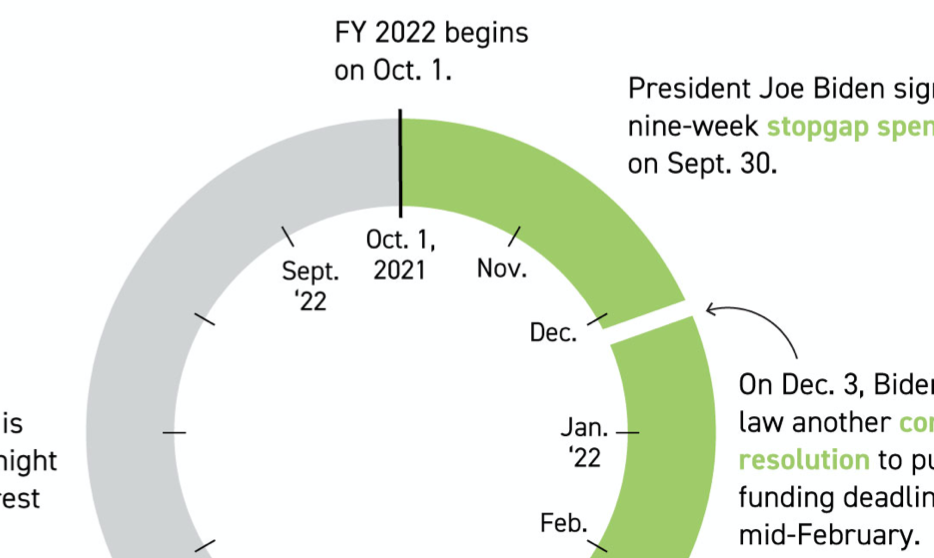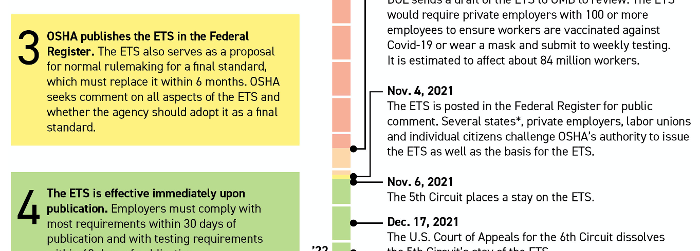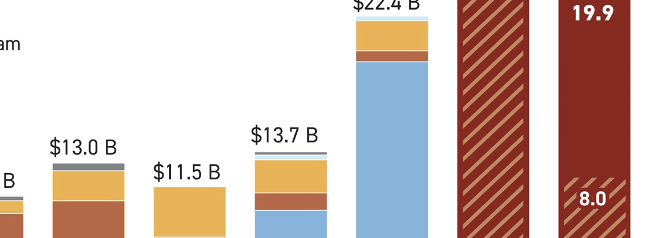Latest news from Washington, D.C. produced by Total Spectrum/SGA exclusively for members of the Arizona Chamber of Commerce & Industry
More Info: Michael DiMaria | Partner and Vice President of Business Development | 602-717-3891 | [email protected]

Happy New Year. Thanks for your interest in Washington, D.C. and thanks for reading This Week in Washington.
Once a year I restate our vision of providing an accurate view into Congressional activity, the Administration’s actions, and national politics exclusively for members of the Arizona Chamber of Commerce and Industry. My perspective is as of a Republican, as is that of Congressman Erik Paulsen. Patrick Robertson provides his perspectives as a Democrat.
This week’s Heard on the Hill is a benchmark report on where Republicans and Democrats are as we start a reelection year. It focuses on Senator John Thune’s decision to run for reelection, and how this election year could have been impacted if he had announced his retirement. Our friend Al Jackson provides his monthly Defense Update, and Ramona Lessen shares the schedule of hearings and happenings on Capitol Hill.
We’ll be back in two weeks for the next issue of This Week. Stay well.

Total Spectrum Managing Director
Heard on the Hill
By Steve Gordon, Total Spectrum Managing Director
Happy, Healthy, and Successful 2022.
I greatly enjoyed being in Arizona last week and attending the Arizona Chamber’s Legislative Forecast Luncheon. Let’s start the year in Washington by reviewing where we are with about 10 months until the mid-term election.
Democrats have their backs against the wall. President Biden’s agenda is stuck in the mud. Majority Leader Schumer can talk about breaking the Senate’s filibuster rules, but he doesn’t have the votes in his own caucus. My guess is that Democrats will have to stop swinging for home runs and start hitting for singles and doubles. Small victories are still victories. We’ll see how that develops.
Republicans start the year with momentum. The off-year election generally bounces against the President’s election… and 2022 is unlikely to be an exception.
The House looks like it will go Republican in November. My old friend Charlie Cook at the Cook Political Report with Amy Walter said in a January 6, 2022 article that “it would seem to take divine intervention, Republican self-destruction, or both to save the House Democratic Majority.” The big factors are Congressional redistricting, the number of Democratic incumbents retiring, the economy and inflation, and the President’s current polls. It has never been fun serving in the House of Representatives as a member of the minority party, and the number of Democratic Congressmen who now want to spend more time with their families tells the whole tale.
The Senate is currently 50-50, so it won’t take much of a wave election to knock the status quo off kilter.
Another great friend of mine is Nathan Gonzales, the publisher of Inside Elections. Nathan said in his January 7, 2022 report that “…Senate Democrats have no room for error. They probably can’t afford to lose even one of their own seats in a challenging environment where President Biden’s job approval rating has leveled off at mediocre.” Nathan also pointed out the historical trend in off-year elections, noting that there have been 27 midterm elections since 1913, when the 17th Amendment was ratified which allowed for the direct election of Senators. The President’s party gained Senate seats in six off-year elections, broke even in two, and lost seats in 19.
Senator John Thune – some background, and a personal disclaimer.
It goes without saying that the President and the Democratic Congressional leadership are looking for ways to start bending the curve and move momentum in their direction. Republican leaders have been working to retain their incumbents and put themselves in position to win in November – so everyone on Capitol Hill over the past five or six months has wondered if Senator John Thune (R-SD), the Republican Whip –the second most senior Senator in the Republican caucus – was going to retire or run for reelection.
John Thune grew up in Murdo, South Dakota, a wide spot on a narrow road. He was a bright student who was also a great athlete, and he was marked for success in his hometown. John earned a bachelor’s degree at Biola University and later a master’s degree in business administration at the University of South Dakota. John got his start in politics as a staff member for U.S. Senator Jim Abdnor (R-SD), who was defeated for reelection by Tom Daschle, who eventually became the Senator Majority Leader.
John Thune went on to serve in various key roles, including a presidential appointment with the U.S. Small Business Administration, the executive director of the South Dakota Republican Party, and then the executive director of the South Dakota Municipal League. John Thune became Congressman Thune in January 1997 and won reelection in 1998 and 2000.
He made a pledge to only serve three terms in the House of Representatives, so John decided to challenge Tim Johnson, South Dakota’s junior Senator in 2002. John lost that race by less than 1,000 votes – a race where I was the fundraising consultant. John was then asked to consider the near impossible task in 2004 of defeating a sitting Senate Majority Leader. John Thune did indeed defeat Senator Tom Daschle in a race that probably went better than 2002 because I was not involved. Senator Thune glided to reelection victories in 2010 and 2016.
Senator Thune has previously served as Chairman of the Senate Commerce, Science, and Transportation Committee, Chairman of the Senate Republican Policy Committee, and Chairman of the Senate Republican Conference. He was elected by his peers in 2020 to be the Republican Whip, the number two position in Republican Senate Leadership.
Senator Thune, Senator John Barrasso (WY), and Senator John Cornyn (TX) are the conventional choices to become Republican Senate Leader when Mitch McConnell retires. But Senator Thune was very non-committal all last year about whether he wanted to run for reelection in 2022 – a run he would surely win in a walk.
I was often asked in 2021 for my opinion whether he would stay in the Senate. My reply was consistent – he will run because Senator Thune has a genuine desire to serve. But a great number of people became concerned as summer turned to fall and the Senator started to look pained and unhappy. Leader McConnell made a public statement in December that he wanted Senator Thune to continue in the Senate, which meant that the Leader and other Republican Senators were putting real pressure on him.
Last Saturday Senator Thune announced that he would indeed stand for reelection in November.
South Dakota is solidly red, so the seat would not have been in peril if Senator Thune had retired. But political waves are built on good candidates, great timing, a dash of good fortune, and momentum. There’s little question Senator Thune leaving the Senate would have created a speed bump for that momentum.
2022 so far has the potential to be a strong Republican cycle.
Defense Update
By Al Jackson, Total Spectrum Strategic Consultant
After months of debate, the Senate voted in December 88-11 to pass the National Defense Authorization Act (NDAA), which authorizes $740 billion in spending for the Department of Defense in Fiscal Year 2022. This will be the 61st consecutive year this legislation has passed both Houses of Congress and sent to the President for signature.
The legislation contains an annual 2.7% pay raise for members of the armed services and increases spending at a level $25 billion more than the administration’s request. The measure also overhauls how certain sexual misconduct crimes are prosecuted under military rules. To ensure passage, the negotiators of the final version dropped language that would have added women to the Selective Service System for potential future conscription. The language was evident in both NDAA versions in the House and Senate but was deemed too controversial for the final bill.
To the dismay of some, including Senator Kirsten Gillibrand (D-NY), the bill does not go far enough in reforming how the military handles serious crimes. Senator Gillibrand voted against final passage in protest of the omission of stronger language. Instead, in the final bill, the Department of Defense would be required to create an independent prosecutorial office within each service to handle serious crimes, including rape, sexual assault, murder, manslaughter, and kidnapping. Senator Gillibrand vowed to pursue this topic again in the FY2023 NDAA bill, as she and others desire for all serious non-military crimes to be taken out of the traditional military chain of command.
Because of the additional $25 billion, the legislation includes authorization for 12 additional Boeing F/A-18 Super Hornets for the Navy. It added five more Boeing F-15EX jets above 12 already planned, and 13 ships total including two attack submarines and two destroyers, resulting in five more than the White House’s budget plan. The NDAA also authorizes 85 Lockheed Martin F-35 aircraft. As it relates to military end strength, the number of Army soldiers would drop by 900 to 485,000 compared to this year’s levels and the Marine Corps would cut its troop numbers by 2,700 to 178,500. The Navy’s end strength total would drop by about 900 to 346,920, which results in approximately 700 more sailors than the White House requested. The Air Force would see a decrease of about 4,200 personnel to 329,222, which is 1,000 more airmen than the administration requested. The Space Force end strength would be set at 8,400 guardians.
One provision provided for a new “Basic Needs Allowance” to give additional financial support to some low-income service members. The legislation also has language to provide 12 weeks parental leave to all service members following the birth or adoption of a child, standardizing the rule across the services.
Of major significance, the bill authorizes $2 billion above the administration’s request for the Pacific Deterrence Initiative, which is designed to bolster the military’s position in the region and deter China, for a total of $7.1 billion. Most of this initiative involves the leadership of the United States Marine Corps. The bill authorizes $4 billion for the European Deterrence Initiative, which is designed to deter Russia by bolstering cooperation with Eastern European allies, an increase over the administration’s $3.4 billion request. Lawmakers added $50 million to the administration’s request for security assistance for Ukraine for a total of $300 million.
Congress approved in the NDAA the retirement of more than 160 legacy aircraft for the Air Force, thereby freeing up money for the service to invest in new technologies, but once again, Members stifled the service’s hopes to retire A-10 Warthogs. The Air Force will be allowed to retire all the aircraft it proposed divesting of in its FY22 budget request, including the 47 F-16C/Ds, 48 F-15C/D Eagles, four E-8 JSTARS ground surveillance aircraft and 20 RQ-4 Global Hawk Block 30 surveillance drones.
Congress did impose significant restrictions on the F-35 program, per planned procurement of the jet by the Air Force, Navy and Marine Corps unless sustainment costs meet the services’ targets. The NDAA would also create an Afghanistan War Commission to review the nearly two decades of war there and review of the failed departure, which resulted in 13 service members killed and over $85 billion of modern weaponry left behind.
In unrelated news, Boeing announced in late December that it had suspended its requirement for U.S.-based employees to be vaccinated against COVID-19. In an internal post to employees, Boeing indicated it made the decision after reviewing several recent developments that thwarted the federal government’s vaccine mandate effort for federal contractors. The Boeing decision was based on a U.S. district court in Georgia decision on Dec. 7 to invoke a preliminary injunction that would prevent the vaccine mandate for contractors required in executive order 14042 from taking effect. This followed another injunction issued by a federal court in Kentucky on November 30, halting a national vaccine mandate for health care workers. As a result, on December 9, the Defense Department issued a memo suspending the enforcement of the mandate to comply with both court orders until further notice. Other defense contractors, both small and large, are doing the same as the Boeing Company.
Congressional Calendar
Tuesday, Jan. 11
- 10 a.m. Senate Energy and Natural Resources Committee hearing – Hydropower Opportunities and Challenges.
- 10 a.m. Senate Judiciary Committee hearing – Domestic Terrorism threat 1 year Later.
- 10 a.m. House Appropriations Committee hearing – US Capitol Security Since January 6
- 10 a.m. Senate Armed Services Committee and Senate Foreign Relations Committee Briefing – US Policy on Afghanistan
- 10 a.m. House Oversight and Reform Committee hearing -Federal Cybersecurity Reform.
- 10 a.m. House Armed Services Subcommittee on Readiness hearing – Red Hill Bulk Facility Storage: The Current Crisis, the Response and the Way Forward.
- 10 a.m. Senate Foreign Relations Committee Closed Briefing: US Policy on Afghanistan.
Wednesday, Jan. 12
- 9 a.m. Senate Foreign Relations Committee Markup – pending nominations
- 9 a.m. Senate Judiciary Committee hearing – pending nominations.
- 9:30 am. Senate Foreign Relations Committee hearing – pending nominations.
- 10 a.m. House Small Business Committee hearing – SBA Management/Performance Challenges
- 10 a.m. House Agriculture Committee hearing – Electric Vehicle Implications for Agriculture/Rural America
- 10 a.m. House Transportation and Infrastructure Subcommittee on Water Resources hearing – Water Resources Development Act Proposals
- 10 a.m. House Appropriations Committee hearing – Continuing Resolution Impacts on the Department of Defense and Services.
- 2:30 pm. Senate Indian Affairs Committee roundtable – Closing the Digital Divide in Native Communities Through Infrastructure Investment.
- 2:45 pm. Senate Environment and Public Works Committee Markup and hearing – USACE investment Implementation of Water Infrastructure Projects, Programs and Priorities.
Thursday, Jan. 13
- 9 a.m. Senate Judiciary Committee Markup – Pending Nominations
- 9:30 am Senate Armed Services Committee hearing – Pending Nominations
- 10:45 am. Senate Homeland Security and Governmental Affairs Committee hearing – Civil Rights Cold Case Records Review Board Nominations
What you need to know about funding the government this year
Covid-19 tracker: Hospitalizations at highest level in a year




















Add comment